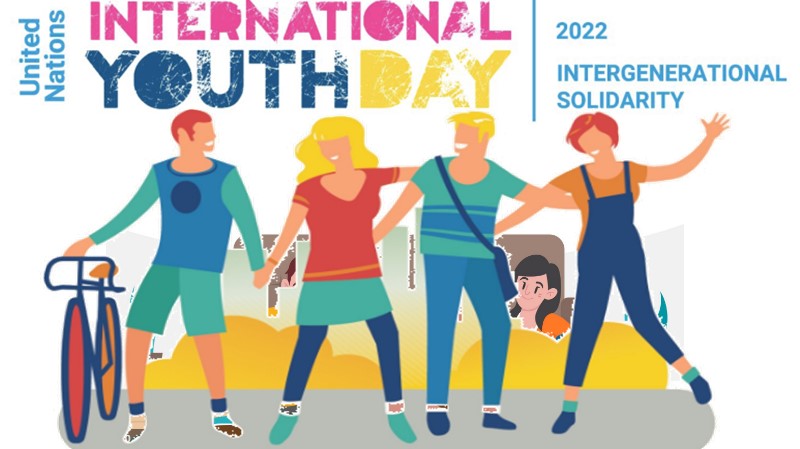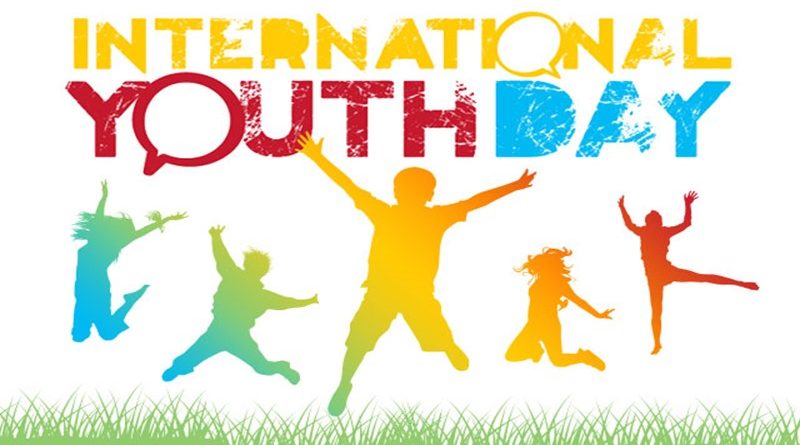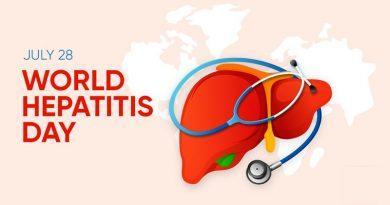International Youth Day 2022 – Intergenerational Solidarity: Creating a World for All Ages
International Youth Day is commemorated every year on 12 August. The Focal Point on Youth selects a theme for the day often with input from youth organizations and members of the UN Inter-Agency Network in Youth development. It also organizes a virtual commemoration of the Day. The Programme encourages youth around the world to organize activities to raise awareness about the situation of youth in their country
The theme for the 2022 International Youth Day is Intergenerational Solidarity: Creating a World for All Ages
The objective of International Youth Day 2022 is to amplify the message that action is needed across all generations to achieve the Sustainable Development Goals (SDGs) and leave no one behind. It will also raise awareness on certain barriers to intergenerational solidarity, notably ageism, which impacts young and old persons, while having detrimental effects on society as a whole.
Ageism is an insidious and often an unaddressed issue in health, human rights and development, and has bearings on both older and younger populations around the world. In addition, ageism regularly intersects with other forms of bias (such as racism and sexism) and impacts people in ways that prevent them to reach their full potential and comprehensively contribute to their community.
The Global Report on Ageism launched by the United Nations in March 2021 highlights that despite lack of research, young people continue to report age-related barriers in various spheres of their lives such as employment, political participation, health and justice. The report also identifies intergenerational interventions as one of the three key strategies to address ageism. Intergenerational activities can also lead to a greater sense of social connectedness and strengthen intergenerational solidarity.
Solidarity across generations is key for sustainable development. As we navigate the third year of the COVID-19 pandemic, it is especially important to recognize and address these age-related barriers to “build back better” in a manner that leverages all generations’ strengths and knowledge.
Did you know?
- Half of the people on our planet are 30 or younger, and this is expected to reach 57% by the end of 2030.
- Survey shows that 67% of people believe in a better future, with 15 to 17 year-olds being the most optimistic about this.
- The majority of people agree that the age balance in politics is wrong. More than two thirds (69%) of people across all age groups agree that more opportunities for younger people to have a say in policy development/change would make political systems better.
- Globally, only 2.6% of parliamentarians are under 30 years old, and less than 1% of these young MPs are women.

Youth Responses to COVID-19
COVID-19 affects all segments of the population, with young people playing a key role in the management of this outbreak and the recovery following the outbreak. Though much is still unknown on how the disease affects young people, governments are mandated in the World Programme of Action for Youth (WPAY) to ensure their services meet the needs of young people. In these circumstances, it is important to ensure that youth are heard alongside other community and patient voices in the rollout of health and non-health interventions in response to COVID-19.
Building up the capacity of youth to be able to make their own decisions on health and to take responsibility for health is also a key element of WPAY. In this context, health education, public health promotion, and evidence-based information are critical in combating the spread and effects of COVID-19, especially to challenge the spread of disinformation online. The role of governments as well as youth organizations and community groups will be essential to ensure that trustworthy public health information is disseminated. Young people themselves are also utilizing online technologies to spread public health information in engaging ways such as videos to promote effective handwashing or explain how social distancing can save lives.
Young innovators are already responding to the virus through social impact innovation. Around the world, a number of initiatives are being developed to leverage young people’s efforts to generate and deliver support to at-risk populations or populations affected by the pandemic. Whilst most of these initiatives are on a voluntary basis (e.g. young people offering to shop for and deliver food to elders or at-risk people), they can also take the shape of social enterprises. Many youth-driven technology innovation hubs are supporting startups to develop effective solutions to address COVID-19. For example, CcHUB (an open living lab and pre-incubation space) in Nigeria is offering to provide financial, research and design support for projects related to COVID-19.
MARKING THE INTERNATIONAL YOUTH DAY: THIS IS YOUR DAY !
Think about what you can do in you community and how you can effectively spread the message. Make it fun and relatable and use all your channels to spread the message. Think Facebook, Twitter, university newsletters, local newspapers.
- Educational radio show. Contact popular local/national radio stations to request a slot to have a discussion with distinguished individuals and youth.
- Organize a (virtual) public meeting or debate to discuss young people’s contributions to global issues.
- Initiate round table discussions among adults and young people to promote intergenerational understanding.
- Organize a youth forum to exchange ideas and discuss cultural backgrounds in order to help young people accept others and popularize a culture of non-violence.
- Organize a (virtual) concert to promote International Youth Day and the launch of the Year. Invite your local musicians and combine it with a panel discussion or invite a politician or policy maker to hold the key note speech.
- Create an “info point” about youth-related issues in the center of town/village, at high schools, or at university centers.
- Organize an exhibition. Get permission to use a public space for an arts exhibit, which showcases the challenges of young people today or how young people are contributing to development. Try to involve young people in the domains of culture, arts and music, to raise awareness on youth-related issues.
- Write to your Minister of Youth to inform him or her about the challenges young people face in their daily lives and to suggest solutions. A list of Ministers of Youth can be found at www.un.org/youth.
A variety of informational material, such as the logo for the International Year of Youth, will be made available on the International Youth Day Trello board, which will be made public ahead of International Youth Day. If you would like to use the logo for your event, read the guidelines for the logo and fill out the liability waiver form, which will also be made available for download.




